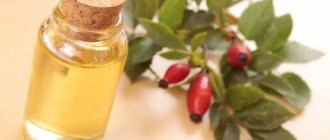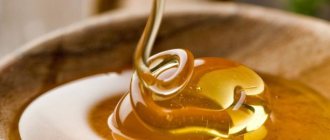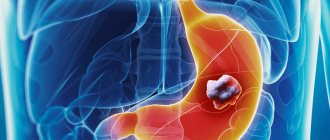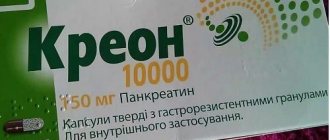Healing properties
The medicinal properties of the drug are due to the healing qualities of its components.
Pharmaceutical chamomile is known for its active action in eliminating inflammatory foci and pain. It also eliminates abdominal spasms in inflammatory pathologies of the digestive tract during the period of remission.
The fruits of dill eliminate inflammation and spasms, thereby reducing pain. Increases the functionality of the digestive tract. Regular consumption of tea containing dill fruits significantly increases the secretion of gastric juice and has a choleretic effect. Preparations with dill are used to eliminate heaviness in the stomach and normalize appetite.
The essential oil contained in mint leaves eliminates spasms of the smooth muscles of the digestive tract and has a carminative and choleretic effect. Peppermint essential oil is also known for its antibacterial properties. Mint preparations are prescribed to patients suffering from irritable stomach syndrome with functional disorders and painful cramps.
Yarrow herb exhibits antibacterial properties, prevents bleeding, spasms and inflammatory processes in the gastrointestinal tract. The use of preparations with yarrow helps to normalize the secretion and motility of the digestive tract.
Due to the bitter content, the secretion of the salivary glands and the production of gastric juice increase. The outflow of bile and the release of gases increases, thereby reducing flatulence and bloating.
Before starting use, you should make sure that there are no allergies to herbal components, since mint is often a strong allergen for people with hypersensitivity to its essential oils.
Composition of gastrointestinal tea Evalar Bio
The composition includes the following natural plants and herbs:
- yarrow herb (stimulates the functioning of the intestinal walls, has an antibacterial effect, has a positive effect on the formation of gastric mucus);
- field chamomile flowers (have a choleretic effect, relieve pain and spasms, help fight foreign pathogens);
- dill fruits (are natural diuretics, soothe and relieve pain);
- peppermint leaves (have a choleretic effect, reduce intestinal tone).
In addition, tea is a source of flavonoids, which help blood circulation, maintaining normal blood vessels (their daily requirement is contained in two filter packs). The caffeine contained in black tea has a tonic effect.
Indications for use
Tea is prescribed as part of the complex treatment of diseases of the digestive tract such as gastritis with high acidity, atrophic gastritis, erosive-ulcerative and inflammatory lesions of the gastrointestinal tract.
The use of the drug is permissible only during remission - use during an exacerbation must be agreed with a doctor. It is recommended to take it as part of a diet during the period of prevention and use it as a source of flavonoids.
Contraindications
Despite the natural herbal composition, there are some contraindications to the use of tea. It is forbidden to take it if there are episodes of individual intolerance to the components of the composition. Use during pregnancy and breastfeeding is unacceptable. You should first consult a gastroenterologist. Before use in pediatrics, consultation with a pediatrician is required.
Monastic tea properties descriptions
Monastic tea or the monastery collection of Father George is a remedy that has a powerful healing effect on your body. Monastic tea is an exclusively natural remedy consisting of various plants growing in Russia and Belarus. It is recommended to drink it both as a general tonic for the body and for the treatment of a number of diseases, such as hypertension, osteochondrosis, diabetes, diseases of the gastrointestinal tract and cardiovascular system.
It is also recommended to use monastery tea as a prophylactic for the eyes, to improve brain activity and memory. Monastic tea, thanks to its natural composition, has a calming effect, which will help you get rid of sleep problems, insomnia will be a thing of the past.
Monastic tea or the monastery collection of Father George is a remedy that has a powerful healing effect on your body
Father George's collection or monastery tea will also help people who want to get rid of excess weight. Tea helps cleanse the body and remove all excess toxins, but it is worth considering that tea has a diuretic effect, so you will go to the toilet more often. This is a low price to pay for getting rid of extra pounds and improving your well-being.
Monastery tea is even used as a remedy to help get rid of addiction to alcohol and cigarettes! There are many reviews on the Internet from happy people who have gotten rid of these addictions. Of course, if the person himself has no desire to give up these habits, then the effect will be reduced significantly.
Monastic tea for diseases of the gastrointestinal tract and gastritis
Stomach tea includes 9 medicinal herbs and is a truly universal remedy for the treatment and prevention of gastrointestinal diseases. Tea therapy helps to cope with such terrible diseases as ulcers, gastritis, colitis, pancreatitis, dysbacteriosis, stool problems, etc. Monastic stomach tea consists of 10 medicinal herbs, which in themselves, individually, are beneficial for the stomach, esophagus and intestines.
The monastery tea for stomach diseases includes calendula, flax seeds, rose hips, St. John's wort, marsh grass, peppermint, wormwood, horsetail, and yarrow flowers. In combination, they act synergistically, due to which tea is so highly effective. Monastic stomach tea has an effect both in the short and long term, and this is its huge advantage.
Herbs for gastritis are brewed as follows: a teaspoon of the mixture is poured with a glass of boiling water (about 200 ml), infused for 15 minutes. Brewed tea is taken as usual - in several doses per day. The patient will feel relief within a few weeks. To achieve maximum therapeutic effect, it is advisable to take tea on an empty stomach.
Rules of application
The filter bag is removed from the individual packaging and filled with one glass of boiling water. Cover the cup with a lid for up to ten minutes. The resulting tea is recommended for use by adults and children over 14 years of age. Can be taken instead of tea during meals. To achieve therapeutic effectiveness, regular use is recommended.
Unused sachets should not be removed from individual packaging, as they will lose their aroma and medicinal qualities. It is also not recommended to prepare tea in advance - the resulting drink should be drunk within 24 hours.
When preparing and using it, it is important to monitor the temperature of the drink consumed. Drinks that are too hot or cold can irritate the mucous membranes of the stomach and intestines, causing exacerbations of chronic gastrointestinal diseases.
Two filter bags per day can provide the daily norm of flavonoids in terms of rutin - 16 mg.
Monastic tea for gastritis
Gastritis is one of the most common and unpleasant diseases of the digestive system. Having determined its presence, few people manage to cope with it forever. After inflammation of the stomach wall, circulatory disorders follow; inadequate blood supply leads to damage to the wall.
The disease becomes chronic and has a periodic nature, which causes exacerbation at the slightest inflammation and disruption of the secretion of gastric juice. Monastic green tea for gastritis helps restore microflora and intestinal function.
In 2013, many specialists conducted full-scale studies that proved the effectiveness of monastery tea for gastritis. More than 1,000 people with stomach and intestinal problems participated in the studies. The results had a stunning effect, since within a few days after administration the patients felt significant relief. Symptoms such as spasmodic pain, a feeling of fullness in the stomach, nausea, bloating and others completely disappeared two weeks after taking it.
In 2013, many specialists conducted full-scale studies that proved the effectiveness of monastery tea for gastritis
It is quite difficult to prepare it at home by simply collecting herbs, because it is necessary to maintain the exact proportions and dosage of each herb and know all the intricacies of their heat treatment. The composition of the monastery tea for gastritis includes calendula, fennel, wormwood, mint, horsetail, St. John's wort, yarrow, chamomile, fireweed, plantain, cinnamon, flax seed, rose hips.
Uses and contraindications of monastery tea for gastritis
Monastic gastric tea is drunk instead of regular tea. Brew 1 - 2 teaspoons of the mixture, pour boiling water over them, approximately 250 ml. After 10 minutes, if the drink has cooled down, you can drink it. For people with stomach problems, hot and cold foods are contraindicated. Therefore, the tea should be warm.
You can take it 2-3 times a day for 2 months. Then you need to take a break for a couple of weeks. This will protect the body from getting used to this composition. Decoctions can only be taken with the permission of a doctor. The concentration of elements in them is much higher. For constipation, you can drink iced tea on an empty stomach in the morning, adding a teaspoon of honey to it. Monastery tea has no side effects. Contraindications to the use of monastery tea for gastritis may include: pregnancy; age up to 10 years; allergy to any of the herbs included in the collection.
The effectiveness of monastery tea for the stomach is weakened by the simultaneous intake of alcoholic beverages. The action of the tea components will be aimed at detoxification, removing alkaloids and their derivatives. The result is a poor therapeutic effect and rapid sobering up. After eating a lot of fatty foods, it is better to wait a couple of hours, then drink tea. The effectiveness of the monastery collection is higher if you drink it an hour before meals.
Adverse reactions
Among the adverse reactions, only intolerance reactions can be observed. They are accompanied by skin rash, swelling, redness of the skin and hives. If such symptoms are detected, you should immediately stop using the tea.
Overdose
There is no data on an overdose of the drug, but it is assumed that excessive consumption of tea can lead to the development of undesirable symptoms. If you find any side symptoms, you should stop taking the medication and take sorbent drugs.
Storage conditions and shelf life
The drug should be stored in its original packaging. For storage, provide a dry place out of direct sunlight and out of reach of children. Store at room temperature. Shelf life is three years from the date of production. After the specified period, taking Evalar gastrointestinal tea is contraindicated.
Cost and analogues
The price of a package of gastrointestinal tea Evalar Bio in Moscow pharmacies is from 94 to 133 rubles. It is recommended to check locally how much you can buy the drug in pharmacies in other cities, as prices may vary.
Analogues of the drug by action:
- gastric herbs, collection;
- stomach tea;
- Blooming Sally;
- pharmaceutical collection of chamomile;
- pharmaceutical collection of peppermint.
Before starting to use any of the drugs, even for preventive purposes, it is recommended to consult with a gastroenterologist about the advisability of using an analogue.










